Sites: news | india | latam | brasil | indonesia
Feeds: news | india | latam | brasil | indonesia
location: Sierra Leone
Social media activity version | Lean version
In Sierra Leone’s fishing villages, a reality check for climate aid
- In April, Mongabay’s Ashoka Mukpo visited the Sherbro estuary, a sprawling riverine ecosystem of mangroves and coastal fishing villages on the Sierra Leonean coastline.
- Like other coastal areas in West Africa, the Sherbro estuary is already suffering the impacts of climate change, including flooding and higher temperatures.
- Between 2016 and 2021, USAID financed mangrove replanting and the construction of makeshift seawalls in villages here as part of a coastal climate resilience aid project.
- The project’s struggles here are an example of the difficulties that climate aid efforts can face when they meet the economic and social needs of people in vulnerable areas.
Inside Sierra Leone’s Tacugama Chimpanzee Sanctuary (video)
- The Tacugama Chimpanzee Sanctuary, located on the outskirts of Freetown, is a refuge for orphaned chimpanzees in Sierra Leone.
- Part of a network of sanctuaries in West Africa, Tacugama provides a home for orphaned western chimpanzees, which are critically endangered.
- Mongabay’s Ashoka Mukpo visited Tacugama in April and sat down with Bala Amarasekaran, the sanctuary’s founder.
In Sierra Leone, local fishers and foreign trawlers battle for their catch
- At wharfs across the Freetown peninsula in Sierra Leone, local fishers say in recent years it’s become harder to get a good catch. They blame foreign trawlers for overexploiting the country’s fish stocks.
- Sierra Leone’s Ministry of Fisheries and Marine Resources says it has systems meant to curb illegal, unreported, and unregulated fishing, but enforcement remains a challenge.
- In 2019, China signed a fisheries agreement with Sierra Leone that includes a promise to build a $55 million harbor, but some fishers say boats owned by its citizens are among the worst offenders.
Sierra Leone lawsuit against diamond mine runs up against corporate opacity
- Residents of Koidu, in eastern Sierra Leone, are suing the operators of a diamond mine they say has polluted the environment, damaged homes, and cost many their livelihoods.
- The mine’s owners, Octea Ltd., say their contracts and obligations are to the Sierra Leonean government and the case should be dismissed.
- Further complicating matters, Octea is part of a complex web of companies ultimately owned by the troubled mining giant BSG Resources, which filed for bankruptcy in 2019.
Coastal deforestation fuels more frequent storms in West Africa, study warns
- Storms are hitting the densely populated coastal pocket of West Africa twice as frequently as 30 years ago, a new study says.
- Declining forest cover is fueling this increased storm frequency in the coastal regions of southern West Africa.
- With the loss of forests, the daytime temperature difference between land and sea is widening, generating stronger winds and feeding convective storms.
- “The coastal location of deforestation in SWA [southern West Africa] is typical of many tropical deforestation hotspots, and the processes highlighted here are likely to be of wider global relevance,” the study authors write.
Industrial fishing harbor plan raises a stink in Sierra Leone
- Landowners and environmental activists have balked at a proposal to build a Chinese-funded fishing harbor in the Sierra Leonean village of Black Johnson.
- The site falls within a national park that’s home to threatened species such as pangolins and chimpanzees, and its lagoon is an important fish-breeding area.
- The government says the project aims to retain a greater share of profits from marine resources within Sierra Leone, given that currently much of the catch from the country’s waters is processed and packaged elsewhere.
- Some in the community support the project, saying it will bring in much-needed infrastructure such as health facilities and piped water, and say those opposed to it are outsiders rather than locals.
In Sierra Leone, two colorful land crabs rediscovered, two new species found
- An expedition to the forests of Sierra Leone, West Africa, revealed two species of crabs new to science and two species not seen in more than half a century.
- The research team found an Afzelius’s crab (Afrithelphusa afzelii), which has had no recorded sighting for 225 years (since 1796), and the Sierra Leone crab, not seen in 66 years.
- Also found were two species of crabs belonging to the genus of the common river crab in West Africa. Only one species of this genus was known to exist in Sierra Leone before now.
- The quest for crabs was sponsored by the conservation organization Re:wild, as the Sierra Leone crab is number eight on Re:wild’s 25 most-wanted lost species list. So far, their Search for Lost Species program has rediscovered seven other lost species.
Entangled: How a global seaweed ‘plague’ threatens West Africa’s coastline
- For nearly a decade, vast quantities of Sargassum seaweed have been washing ashore on either side of the Atlantic.
- The seaweed hampers the activities of coastal communities and damages ecosystems.
- Researchers are working to better understand the phenomenon, which may be linked to wind and ocean currents shifted by climate change, to nutrient-rich discharge from the Amazon and Congo rivers, or iron-laden dust from the Sahara.
- The seaweed comes from a new perennial bloom that may be a permanent feature of the Atlantic Ocean.
10-year plan hopes to give western chimpanzees a fighting chance
- The IUCN recently released its latest 10-year action plan for the critically endangered western chimpanzee.
- Poaching, habitat loss and disease were identified as the key threats to the species.
- These threats were found to be exacerbated by the high rate of population growth in West Africa, resulting in rapid agricultural expansion and a demand for economic development projects.
- The IUCN plan sets out nine strategies to be implemented between 2020 and 2030; they include filling research gaps, ensuring chimpanzees are considered in land use planning, improving legal protection, and raising awareness of the plight of western chimpanzees.
‘They took it over by force’: Corruption and palm oil in Sierra Leone
- Sierra Leone is among the poorest countries in the world. In the 1990s, when other African countries were privatizing key industries in order to attract foreign investment and become eligible for international loans, a civil war was raging in Sierra Leone that prevented the country from taking part in the controversial structural adjustment programs initiated by the World Bank and the Inter-national Monetary Fund.
- Sources say that the country, eager to catch up, has been rushing into deals with foreign investors without first enacting legislation to protect the interests of local landowners. In 2011, Socfin entered into a 50-year land lease agreement with the Sierra Leonean government and local authorities, which was soon followed by two more agreements. In less than 10 years, the forest and farmland around the chiefdom of Sahn Malen was transformed into thousands of hectares of monoculture oil palm fields.
- Reception to the plantation has been divided. Some area residents say they welcome the jobs and income the company provides. But others allege the deal with Socfin was exploitative and corrupt.
- A leaked government report from 2019 found several irregularities surrounding Socfin’s Sahn Malen operations, including a concession area on the ground that’s larger than what is stipulated in the lease agreements and evidence of financial mismanagement by local authorities.
How the legacy of colonialism built a palm oil empire
- Due to the legacy of decades of colonial rule and the subsequent lack of local expertise and capital needed to meet the requirements of the World Bank’s economic incentive programs, newly independent governments drew on foreign capital during decolonization in the mid-20th to keep businesses and exports running. As a result, some of the biggest tropical commodity companies were founded during colonial times and still operate in countries once occupied by colonial powers.
- One of these is Société Financière des Caoutchoucs (Socfin), a Belgian holding company that operates palm oil and rubber plantations through dozens of subsidiaries across Africa and Southeast Asia.
- For years, Socfin has been rebuked by civil society organizations for alleged human rights violations at its plantations. Several lawsuits and complaints have been submitted over alleged misconduct including irregularities in land acquisition processes, poor working and housing conditions and the absence of the sustainable inclusion of local farmers.
- Socfin, meanwhile, refutes criticism of its operations, saying its aim is to further development in Africa and ensure that local communities and their workers are the beneficiaries of their operations.
For the western chimpanzee, sanctuaries are more than just a last resort
- West Africa’s chimpanzee population has dropped dramatically since the 1960s, falling from an estimated 1 million to fewer than 300,000 today.
- Across West Africa, a network of sanctuaries is working to provide shelter for chimpanzees rescued from traffickers.
- Members of the Pan African Sanctuary Alliance say their work goes beyond simply caring for individual apes, extending to protecting wild chimpanzee populations and supporting the people who share their habitats.
Chimps in Sierra Leone adapt to human-impacted habitats, but threats remain
- Western chimpanzees are adapting to survive in severely degraded habitat, a new study says.
- However, the study also finds the abundance of western chimpanzees in Sierra Leone is impacted by even secondary roads.
- Ensuring the long-term survival of western chimps calls for changes in agriculture, roads and other development, researchers say.
Was Sierra Leone’s one-month fishing ban enough to replenish fish stocks?
- The Sierra Leone government closed the country’s waters to fishing by industrial vessels during the entire month of April to give flagging fish stocks a chance to rebuild. During that period artisanal fishers were allowed to fish.
- Both industrial and artisanal fishers appeared to support the closure, the first of its kind, amid declining catches and an influx of virtually unregulated foreign fishing vessels.
- Officials declared the closure a success, as part of Sierra Leone’s broader effort to formalize and gain regulatory control of its fisheries.
- However, outside experts have expressed doubt that the move would do much to improve the state of the country’s fisheries.
Lost in translation: Green regulations backfire without local context
- Strong green regulations modeled on those in industrialized countries don’t always have the intended effects of reducing conflict and environmental degradation, new research shows.
- These rules can place onerous burdens on small-scale producers that ultimately force them to go around the regulations, at times leading to more conflict and harm to the environment.
- The study’s author argues that regulations should be flexible enough to accommodate small-scale producers and the unique challenges they face.
Animal trainers are teaching wildlife to conserve themselves
- Positive training helps pets and their owners bond. But animal trainers working to conserve wildlife often have the opposite goal: teaching animals in the wild to avoid human beings — people often being the most dangerous creatures in the jungle.
- Wildlife kept in zoos have been trained with rewards to accept unnatural processes, procedures that previously might have required restraint or even anesthesia: allowing tooth brushing, hoof trimming, injections and blood draws — turning once alien actions into positive experiences for the captive animals.
- Animal trainers decades ago learned to train dolphins without having physical contact with the animals. More recently, a chimpanzee troop in Sierra Leone was taught to scream alarm in unison when poachers approached, alerting nearby rangers to come to the rescue — achieving an 80 percent decrease in poaching.
- Trainers have taught captive bred condors how to be more like wild condors, seeking food within their natural habitat and not congregating in towns. They’ve also taught polar bears to avoid anything associated with humans, preventing the bears from raiding trash cans and significantly decreasing wildlife conflicts.
Western Chimpanzee numbers declined by more than 80 percent over the past quarter century
- Research published in the American Journal of Primatology earlier this month finds that the overall Western Chimpanzee population declined by six percent annually between 1990 and 2014, a total decline of 80.2 percent.
- The main threats to the Western Chimpanzee are almost all man-made. Habitat loss and fragmentation driven by slash-and-burn agriculture, industrial agriculture (including deforestation for oil palm plantations as well as eucalyptus, rubber, and sugar cane developments), and extractive industries like logging, mining, and oil top the list.
- In response to the finding that the Western Chimpanzee population has dropped so precipitously in less than three decades, the International Union for the Conservation of Nature (IUCN) elevated the subspecies’ status to Critically Endangered on its Red List of Threatened Species.
West African countries come together to stop the illegal rosewood trade
- Several species of rosewood, belonging to the genera Dalbergia and Pterocarpus and collectively known as hongmu, are highly sought after by Chinese furniture manufacturers, who use them to make products that are coveted status symbols.
- The majority of rosewood imports into China have traditionally come from Southeast Asian countries, but West Africa has become one of the largest exporting regions feeding China’s growing demand for rosewood in the past few years.
- In 2014, nearly half of China’s rosewood imports came from Nigeria, Ghana, and other African countries, which supplied just 10 percent of Chinese rosewood imports a decade ago.
Meager post-Ebola harvests worsen food insecurity in West Africa
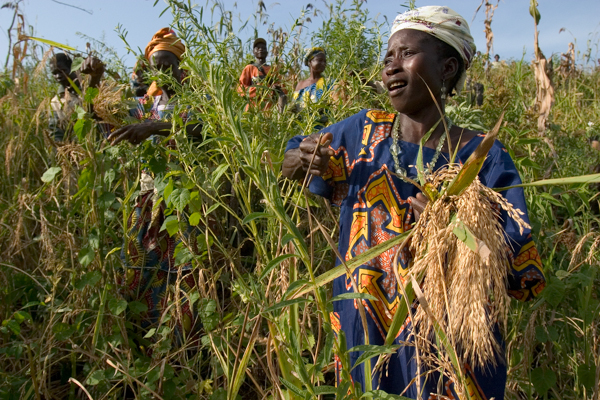 Villagers harvest rice in Sierra Leone. Harvesting is often a communal affair in West African nations, but the Ebola crisis interfered with group activities and disrupted many other aspects of agricultural production in the region. Photo credit: ©FAO/Peter DiCampo. Pedelers Salee Craig used to grow vegetables. Near his home in Monrovia, Liberia, he planted peppers […]
Villagers harvest rice in Sierra Leone. Harvesting is often a communal affair in West African nations, but the Ebola crisis interfered with group activities and disrupted many other aspects of agricultural production in the region. Photo credit: ©FAO/Peter DiCampo. Pedelers Salee Craig used to grow vegetables. Near his home in Monrovia, Liberia, he planted peppers […]
Coordinated protests hit Socfin plantations in four countries
 Protesters demonstrate in front of Bolloré’s headquarters near Paris calling on the multinational conglomerate to return land, or compensate farmers, over disputed concessions for plantations in Cambodia and three African countries yesterday. Bollore is the largest shareholder of Socfin, which has been accused by activists of land grabs in Cambodia, Liberia, Cameroon and Ivory Coast. […]
Protesters demonstrate in front of Bolloré’s headquarters near Paris calling on the multinational conglomerate to return land, or compensate farmers, over disputed concessions for plantations in Cambodia and three African countries yesterday. Bollore is the largest shareholder of Socfin, which has been accused by activists of land grabs in Cambodia, Liberia, Cameroon and Ivory Coast. […]
Flag states can be held liable for violations of fishing vessels abroad, international tribunal rules
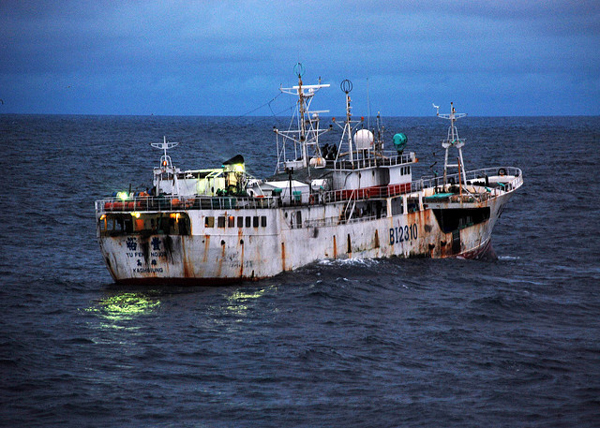 Yu Feng, a vessel with Taiwanese flags suspected of fishing illegally, sails near Sierra Leone in 2009 before being detained by the U.S. Coast Guard and Sierra Leonean government agencies. Photo credit: U.S. Department of Defense/Petty Officer 2nd Class Shawn Eggert, U.S. Coast Guard. The International Tribunal for the Law of the Sea ruled in […]
Yu Feng, a vessel with Taiwanese flags suspected of fishing illegally, sails near Sierra Leone in 2009 before being detained by the U.S. Coast Guard and Sierra Leonean government agencies. Photo credit: U.S. Department of Defense/Petty Officer 2nd Class Shawn Eggert, U.S. Coast Guard. The International Tribunal for the Law of the Sea ruled in […]
Rainforest loss increased in the 2000s, concludes new analysis
 Click charts to enlarge Loss of tropical forests accelerated roughly 60 percent during the 2000s, argues a paper published in the journal Geophysical Research Letters. The findings contradict previous research suggesting that deforestation slowed since the 1990s. The study is based on a map of 1990 forest cover developed last year by Do-Hyung Kim and […]
Click charts to enlarge Loss of tropical forests accelerated roughly 60 percent during the 2000s, argues a paper published in the journal Geophysical Research Letters. The findings contradict previous research suggesting that deforestation slowed since the 1990s. The study is based on a map of 1990 forest cover developed last year by Do-Hyung Kim and […]
Selective logging causes long-term changes to forest structure
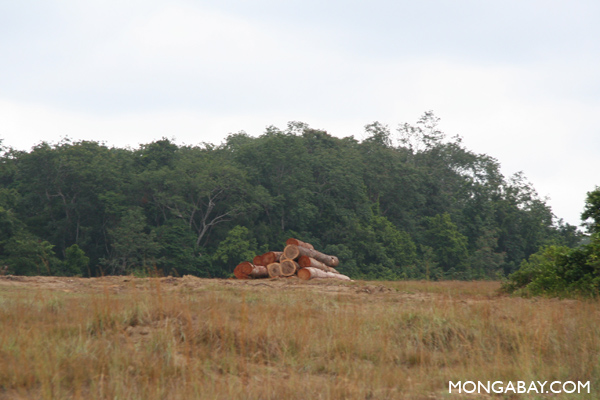 Logging in Gabon. Photos by Rhett A. Butler Selective logging is causing long-term changes to tropical forests in Africa by facilitating the growth of weeds and vines, which reduces plant diversity and diminishes carbon storage, reports a new paper published in the journal Ecological Research. The paper, led by Roberto Cazzolla Gatti of the University […]
Logging in Gabon. Photos by Rhett A. Butler Selective logging is causing long-term changes to tropical forests in Africa by facilitating the growth of weeds and vines, which reduces plant diversity and diminishes carbon storage, reports a new paper published in the journal Ecological Research. The paper, led by Roberto Cazzolla Gatti of the University […]
Don’t eat or touch bat bushmeat amid worsening Ebola outbreak, UN warns
 The world’s worst Ebola outbreak was likely begun by a hunter shooting a fruit bat for their dinner or the market, according to the UN. The outbreak has killed over 660 people in six months to date, and recently spread via plane to Nigeria. The disease is particularly deadly with a mortality rate of around […]
The world’s worst Ebola outbreak was likely begun by a hunter shooting a fruit bat for their dinner or the market, according to the UN. The outbreak has killed over 660 people in six months to date, and recently spread via plane to Nigeria. The disease is particularly deadly with a mortality rate of around […]
Mysterious pygmy hippo filmed in Liberia
Conservationists have captured the first ever footage (see video below) of the elusive pygmy hippo (Choeropsis liberiensis) in Liberia. The forest-dwelling, nocturnal species—weighing only a quarter of the size of the well-known common hippo (Hippopotamus amphibius)—has proven incredibly difficult to study. But the use of camera traps in Liberia’s Sapo National Park has allowed researchers […]
Sierra Leone creates rainforest park
Sierra Leone, one of Africa’s poorest countries, today announced the establishment of Gola Rainforest National Park (GRNP), an area of forest home to chimpanzees, a key population of pygmy hippo, and hundreds of bird species, reports the Royal Society for the Protection of Birds (RSPB). The park covers 71,000 hectares (175,000 acres) in southeastern Sierra […]
Loss of old growth forest continues
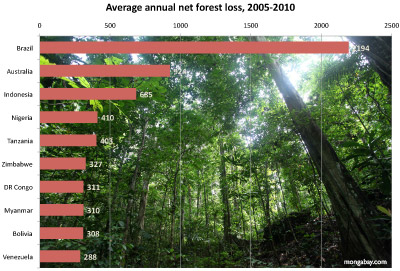 More coverage: Rainforest loss slows A new global assessment of forest stocks by the U.N. Food and Agriculture Organization (FAO) shows continuing loss of primary forests since 2005 despite gains in the extent of protected areas. FAO’s Global Forest Resources Assessment 2010 reveals some 13 million hectares of forest were cleared between 2000 and 2010, […]
More coverage: Rainforest loss slows A new global assessment of forest stocks by the U.N. Food and Agriculture Organization (FAO) shows continuing loss of primary forests since 2005 despite gains in the extent of protected areas. FAO’s Global Forest Resources Assessment 2010 reveals some 13 million hectares of forest were cleared between 2000 and 2010, […]
Sierra Leone cracks down on illegal logging by banning log exports
Sierra Leone has banned the transport and export of logs in an effort to crack down on illegal logging, reports AFP. “Illegal logging is having adverse effect on the country’s environment and depleting the ozone layer and most be stopped with immediate effect,” said a statement issued by President Ernest Koroma’s office. Violations of the […]
Sierra Leone bans timber exports
Sierra Leone bans timber exports Sierra Leone bans timber exports mongabay.com January 15, 2008 Sierra Leone has re-imposed a timber export ban after accusing foreign companies of illegally logging its forests, according to BBC News. The ban will remain in effect until the government develops a policy to ensure that local communities benefit from forestry. […]
Poverty and corruption reduce effectiveness of rainforest parks
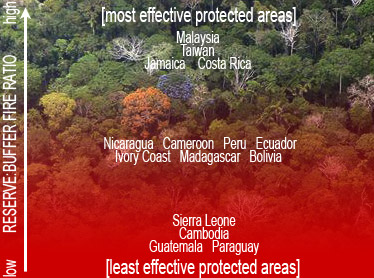 Poverty and corruption reduce effectiveness of rainforest parks Poverty and corruption reduce effectiveness of rainforest parks mongabay.com July 9, 2007 Corruption and poverty make for ‘paper parks’ Poverty and corruption are linked to higher incidence of fire in tropical forest reserves, reports a new study published in the journal Ecological Applications. Poor, corrupt countries — […]
Poverty and corruption reduce effectiveness of rainforest parks Poverty and corruption reduce effectiveness of rainforest parks mongabay.com July 9, 2007 Corruption and poverty make for ‘paper parks’ Poverty and corruption are linked to higher incidence of fire in tropical forest reserves, reports a new study published in the journal Ecological Applications. Poor, corrupt countries — […]
Goodbye to West Africa’s Rainforests
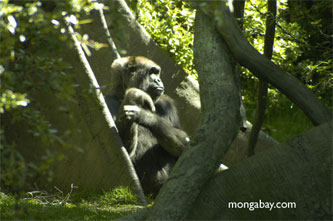 Goodbye to West Africa’s Rainforests Goodbye to West Africa’s Rainforests Rhett A. Butler, mongabay.com January 22, 2006 The state of West Africa’s rainforests West Africa’s once verdant and extensive rainforests are now a historical footnote. Gone to build ships and furniture, feed hungry mouths, and supply minerals and gems to the West, the band of […]
Goodbye to West Africa’s Rainforests Goodbye to West Africa’s Rainforests Rhett A. Butler, mongabay.com January 22, 2006 The state of West Africa’s rainforests West Africa’s once verdant and extensive rainforests are now a historical footnote. Gone to build ships and furniture, feed hungry mouths, and supply minerals and gems to the West, the band of […]
Feeds: news | india | latam | brasil | indonesia
 Villagers harvest rice in Sierra Leone. Harvesting is often a communal affair in West African nations, but the Ebola crisis interfered with group activities and disrupted many other aspects of agricultural production in the region. Photo credit: ©FAO/Peter DiCampo. Pedelers Salee Craig used to grow vegetables. Near his home in Monrovia, Liberia, he planted peppers […]
Villagers harvest rice in Sierra Leone. Harvesting is often a communal affair in West African nations, but the Ebola crisis interfered with group activities and disrupted many other aspects of agricultural production in the region. Photo credit: ©FAO/Peter DiCampo. Pedelers Salee Craig used to grow vegetables. Near his home in Monrovia, Liberia, he planted peppers […] Yu Feng, a vessel with Taiwanese flags suspected of fishing illegally, sails near Sierra Leone in 2009 before being detained by the U.S. Coast Guard and Sierra Leonean government agencies. Photo credit: U.S. Department of Defense/Petty Officer 2nd Class Shawn Eggert, U.S. Coast Guard. The International Tribunal for the Law of the Sea ruled in […]
Yu Feng, a vessel with Taiwanese flags suspected of fishing illegally, sails near Sierra Leone in 2009 before being detained by the U.S. Coast Guard and Sierra Leonean government agencies. Photo credit: U.S. Department of Defense/Petty Officer 2nd Class Shawn Eggert, U.S. Coast Guard. The International Tribunal for the Law of the Sea ruled in […] Click charts to enlarge Loss of tropical forests accelerated roughly 60 percent during the 2000s, argues a paper published in the journal Geophysical Research Letters. The findings contradict previous research suggesting that deforestation slowed since the 1990s. The study is based on a map of 1990 forest cover developed last year by Do-Hyung Kim and […]
Click charts to enlarge Loss of tropical forests accelerated roughly 60 percent during the 2000s, argues a paper published in the journal Geophysical Research Letters. The findings contradict previous research suggesting that deforestation slowed since the 1990s. The study is based on a map of 1990 forest cover developed last year by Do-Hyung Kim and […] Logging in Gabon. Photos by Rhett A. Butler Selective logging is causing long-term changes to tropical forests in Africa by facilitating the growth of weeds and vines, which reduces plant diversity and diminishes carbon storage, reports a new paper published in the journal Ecological Research. The paper, led by Roberto Cazzolla Gatti of the University […]
Logging in Gabon. Photos by Rhett A. Butler Selective logging is causing long-term changes to tropical forests in Africa by facilitating the growth of weeds and vines, which reduces plant diversity and diminishes carbon storage, reports a new paper published in the journal Ecological Research. The paper, led by Roberto Cazzolla Gatti of the University […] The world’s worst Ebola outbreak was likely begun by a hunter shooting a fruit bat for their dinner or the market, according to the UN. The outbreak has killed over 660 people in six months to date, and recently spread via plane to Nigeria. The disease is particularly deadly with a mortality rate of around […]
The world’s worst Ebola outbreak was likely begun by a hunter shooting a fruit bat for their dinner or the market, according to the UN. The outbreak has killed over 660 people in six months to date, and recently spread via plane to Nigeria. The disease is particularly deadly with a mortality rate of around […] More coverage: Rainforest loss slows A new global assessment of forest stocks by the U.N. Food and Agriculture Organization (FAO) shows continuing loss of primary forests since 2005 despite gains in the extent of protected areas. FAO’s Global Forest Resources Assessment 2010 reveals some 13 million hectares of forest were cleared between 2000 and 2010, […]
More coverage: Rainforest loss slows A new global assessment of forest stocks by the U.N. Food and Agriculture Organization (FAO) shows continuing loss of primary forests since 2005 despite gains in the extent of protected areas. FAO’s Global Forest Resources Assessment 2010 reveals some 13 million hectares of forest were cleared between 2000 and 2010, […] Poverty and corruption reduce effectiveness of rainforest parks Poverty and corruption reduce effectiveness of rainforest parks mongabay.com July 9, 2007 Corruption and poverty make for ‘paper parks’ Poverty and corruption are linked to higher incidence of fire in tropical forest reserves, reports a new study published in the journal Ecological Applications. Poor, corrupt countries — […]
Poverty and corruption reduce effectiveness of rainforest parks Poverty and corruption reduce effectiveness of rainforest parks mongabay.com July 9, 2007 Corruption and poverty make for ‘paper parks’ Poverty and corruption are linked to higher incidence of fire in tropical forest reserves, reports a new study published in the journal Ecological Applications. Poor, corrupt countries — […] Goodbye to West Africa’s Rainforests Goodbye to West Africa’s Rainforests Rhett A. Butler, mongabay.com January 22, 2006 The state of West Africa’s rainforests West Africa’s once verdant and extensive rainforests are now a historical footnote. Gone to build ships and furniture, feed hungry mouths, and supply minerals and gems to the West, the band of […]
Goodbye to West Africa’s Rainforests Goodbye to West Africa’s Rainforests Rhett A. Butler, mongabay.com January 22, 2006 The state of West Africa’s rainforests West Africa’s once verdant and extensive rainforests are now a historical footnote. Gone to build ships and furniture, feed hungry mouths, and supply minerals and gems to the West, the band of […]